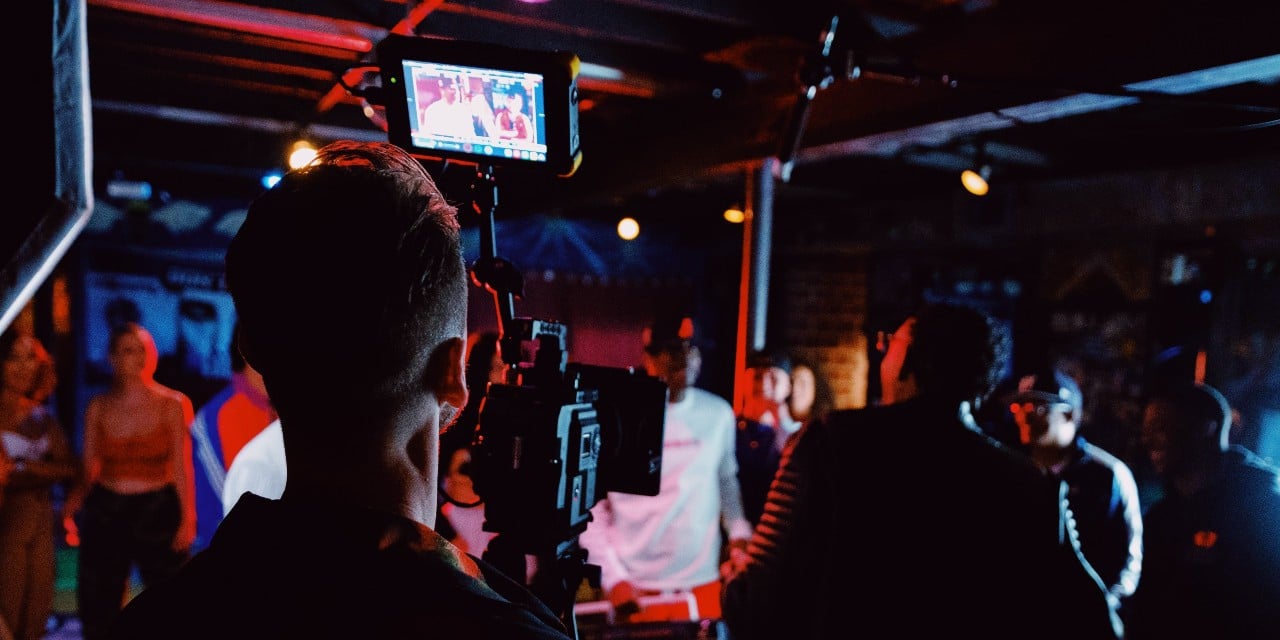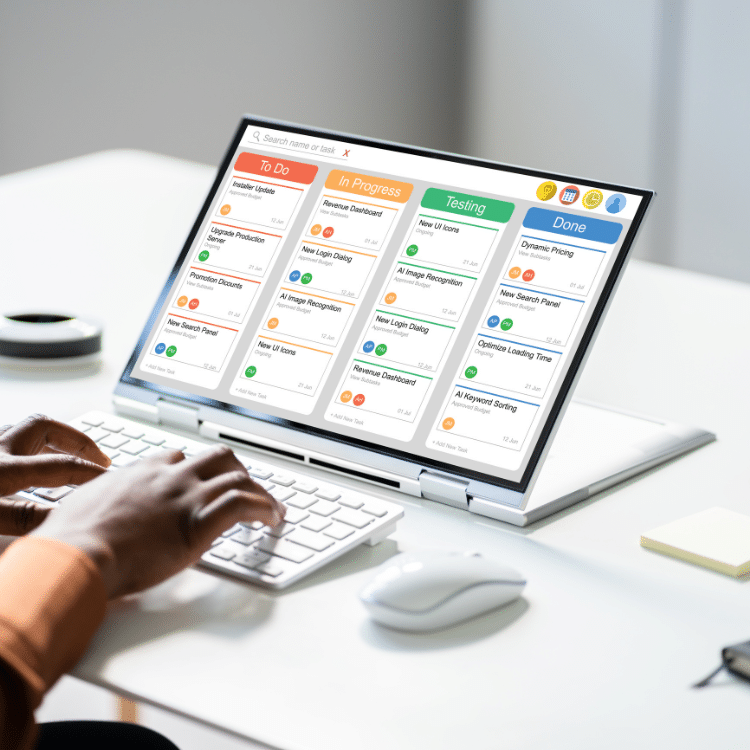It’s almost a year since we published our 2020 predictions for the events industry COVID-19, literally weeks before the pandemic made its way to the UK and we were in sweet ignorance as to what was about to unfold. No one could have predicted what happened globally nor the effect the pandemic has had on our industry. It brings a whole new irony to hindsight being 2020! Some of the things we did hit on – although we had no idea to the extent – was a prediction of an increase in virtual or online events and tech, as well as an emphasis on sustainability.
Event Tech Predictions 2021
Here we are once more, reflecting on what has been and looking to the future to predict what the next year of the events landscape may look like.
Digital Revolution and Hybrid Events following Covid-19
Covid-19 has accelerated a digital revolution across all industries, but particularly in events.
“Since the 1980s, the digital revolution has been both a negative and positive force. Within a few weeks of the Covid-19 outbreak, lockdown accelerated the adoption of digital solutions at an unprecedented pace, creating unforeseen opportunities for scaling up alternative approaches to social and economic life.”
https://www.tandfonline.com/doi/full/10.1080/21582041.2020.1833234
The events industry has been notoriously behind other sectors when it comes to embracing tech. When the pandemic hit the UK in March 2020 and we could no longer meet, we turned online to keep in touch, to hold meetings, and to host events. Whereas online events were nothing new, “Hybrid Events” became the buzz words of the industry. The idea behind hybrid events is the bringing together of the best of both worlds – live experience and online content, or “in-person” and “online”. There is debate in the industry over whether these hybrids will continue in the future, and whether online will replace in-person forever. There are pros and cons to each, one of the biggest positives of hybrid events being sustainability.
Digitalisation forces the hand of sustainability in the events world
 The events industry has never had a reputation for being particularly “green”. Big scale events and exhibitions have a large carbon footprint, so the pandemic has given the industry the proverbial ‘kick up the ar*e’ it needed to improve sustainability. It’s not particularly environmentally friendly to fly keynote speakers or delegates from all over the world to one location for a day or two and then back again. Hybrid and online events that replace the need for travel is one example of a sustainability shift.
The events industry has never had a reputation for being particularly “green”. Big scale events and exhibitions have a large carbon footprint, so the pandemic has given the industry the proverbial ‘kick up the ar*e’ it needed to improve sustainability. It’s not particularly environmentally friendly to fly keynote speakers or delegates from all over the world to one location for a day or two and then back again. Hybrid and online events that replace the need for travel is one example of a sustainability shift.
Covid-19 has forced us to look at events in different ways and challenge “norms’’. Is it necessary to print conference programmes when an online programme could be better, cheaper and more sustainable? The same goes for badges or any other printing, where contactless check-ins and apps can replace them.
Other sustainability aspects to reconsider post covid-19 will be the need for more space at live events due to social distancing measures, as well as an increase in sanitation and chemicals use. Not to mention the waste produced by masks, gloves and face shields.
By delivering more online and adapting to Hub and Spoke events, the events industry could be a leader in sustainability change and innovation, rather than the bad guy!
Hub and Spoke Hybrid Events

We think these kinds of events hold the most longevity for the future. Having a central “hub” location, for example a central live in-person event in London in front of an audience, but with mini events or “spokes” elsewhere, possibly worldwide, streamed into the main event. It’s far more cost effective to stream rather than fly a speaker in, and events could potentially get better talent by streaming, and possibly reach a bigger audience.
A well-known keynote speaker for example could plausibly speak at two events in one day online with no travel cost to the event or the environment– rather than spending 3 days flying to London to speak for an hour and then head back again. The “spokes” themselves are smaller versions of the main “hub” event, and could be held regionally with their own, smaller live audience streamed into the main event. When done well these online events can be really effective, but taking an event online requires investment in production. Endless Events are a market leader in this area, check out this article that looks at 5 Hybrid Events done really well.
Content Driven Events shine online
Another area where online makes more sense is when an event if very content heavy. Rather than the usual meetings, stands and discussions, it could be more useful to deliver the content online for delegates to digest in their own time. A willingness to break from tradition is needed – an event doesn’t all have to be consumed within 48 hours. It could be spread out and watched at leisure rather than live.

Hybrid and Online won’t solve it all
People can easily disengage from fully online exhibitions and conferences; they can get distracted and go do something else. We know this happens with live in-person events too – but it’s a bit harder to sneak out of a live event unnoticed!
The other downside of online events is there is no magic of going to a fantastic venue or space, of having human contact and making a serendipitous connection. We have said it before and we will say it again, humans need human interactions – it’s why we have events at all. So, whereas hybrid and online events may be more cost effective, potentially reach larger audiences and be more sustainable, how will these new platforms affect engagement?
Don’t try to replicate the real world
The biggest mistake with adapting to an online platform is that in the beginning the software tries to replicate the real world. Early social networks worked the same way, by trying to replicate what was real world (handshakes) with a rather strange and intrusive “poke”! Thankfully these have all fallen by the wayside as our use and engagement becomes more intelligent. As our co-founder Mark Walls says “There are so many annoying things about the real world, why would you want to replicate those online?”
The first wave of online and hybrid events did just that, but the experience was not beneficial or enjoyable. Now is the time to think about how to disrupt and improve the online experience.
“In 2021, we are sure to have more advanced tools at our disposal and AV partners with increasingly better solutions. All this is good news, but where we can make the biggest stride forward is in developing new concepts for virtual events. This is crucial for virtual events to thrive because attendees are rarely excited by one-hour-long webinars that feature bullet point filled presentations and have only the dying minutes allocated to questions and answers.
Virtual events can take so many diverse formats with different durations, different ways to deliver or discuss content and different participation styles. I firmly believe that we will see the emergence of different concepts and we will draw a line between another “webinar” and virtual events that we can get excited about. What they will be called is for us to define, but that is what I am going to invest my time in 2021.”
Miguel Neves – Online/Virtual Events Producer and Chief Social Strategist
Online Events must raise production value in order to succeed

Without a doubt, the production quality of online events has to be high. We expect so much more as our tastes, knowledge and expectations advance. Where money can be saved without venue or staging costs, additional costs must be put into production.
We are no longer happy with a PowerPoint presentation being clicked through by a speaker with as much charisma as a vegan roast dinner. Our tastes as consumers are more refined and we expect a certain level of production quality. As we’ve all been at home watching Netflix and Amazon Prime for the past year, it’s truer than ever. Brandt Kreuger even calls it the “netflixification of events”
“People already make the choice. Is it worth it to pack up the whole family for a movie, paying a gazillion dollars for tickets and popcorn? Or maybe we should just wait for it to come out on Disney Plus? People are going to start behaving the same way with events. Is this event worth it to me to take 4 days out of the office to fly 6 hours and live out of a hotel for 3 days? Or will I just watch it online? Are you going to leave these people behind? Much like the blockbuster movies make you go, “Oh, man I wish I was seeing this in the theatre!”, so must our blockbuster online and hybrid events drive interest in our in-person events!”
Take Ted Talks for example. What started off as an event is now a content business with its own channel and app. The production quality is second to none, and Ted is one of the go-to places for expert knowledge and reliable, quality information. The bar is high for content and production which offers a new landscape of opportunity for the events world – if it’s done right.
Event Staffing in the New World post Covid-19
One of the biggest hits the event industry has taken is right in the staffing. Ouch – and we felt that here at Liveforce. As organizers canceled event after event, many event professionals, planners, and freelancers lost their jobs, left the industry, and had to take on completely different roles. The pandemic has caused a “brain-drain” as Krueger refers to it in this great interview from Event Tech, and a tragic loss of talent from the industry.
When – not if – in-person events return, the industry will feel this loss of talent and skills. There will also be new roles to consider as AV and tech will continue to play a larger part in event planning and production. How will event planners find and hire these event tech profs? Will the event freelancers reconnect with the event companies they worked with in 2019? How will full-time planners who found themselves out of work in 2020, reinvent themselves as third party consultants and back into the industry in 2021?
It’s time to embrace the “new world” and the skills and roles needed to push the events industry along.





